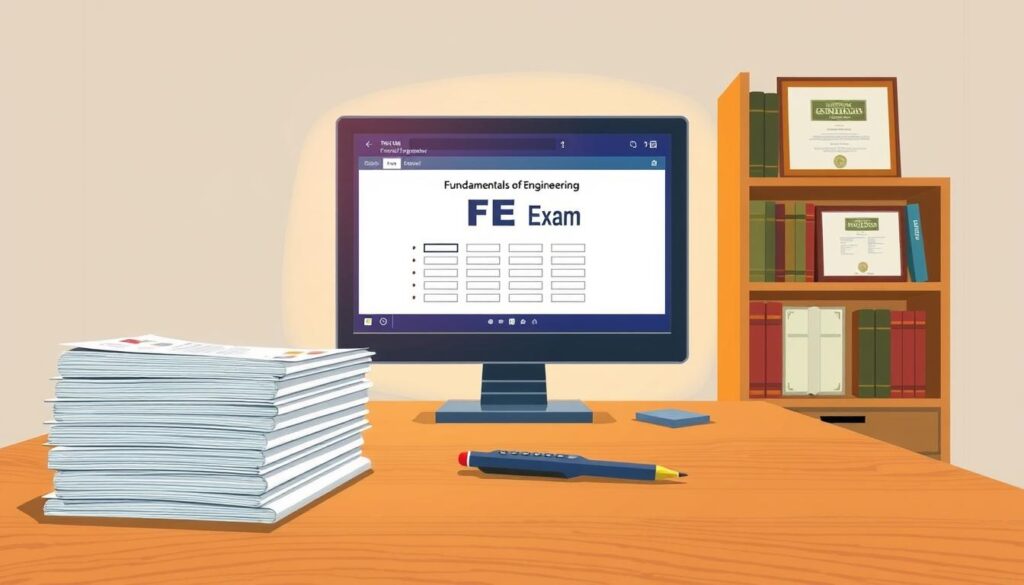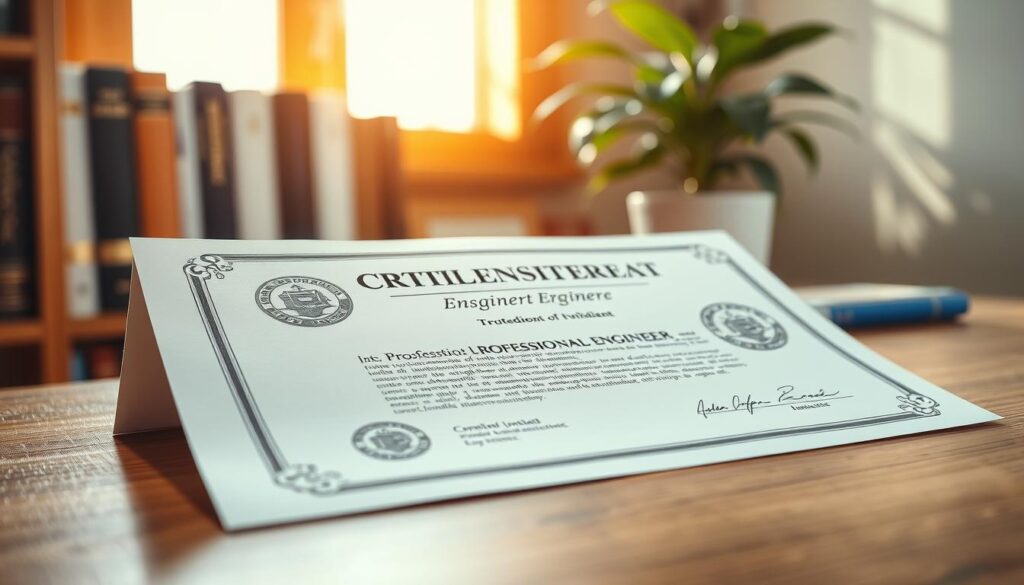In the United States, becoming a licensed professional engineer is a significant career milestone. With over 320,000 licensed engineers, the field is highly competitive, and having the right credentials can make all the difference.
To become a licensed professional engineer, one must pass the Fundamentals of Engineering (FE) exam and the Principles and Practice of Engineering (PE) exam. This rigorous process requires dedication and a thorough understanding of engineering principles and practices.
Obtaining a degree from an accredited program is the first step towards achieving this goal. In this article, we will explore the essential requirements for obtaining a professional engineer license in the United States.
Key Takeaways
- Passing the FE and PE exams is crucial for becoming a licensed professional engineer.
- A degree from an accredited program is a fundamental requirement.
- The licensure process involves a thorough understanding of engineering principles and practices.
- Becoming a licensed professional engineer can significantly enhance career prospects.
- The process requires dedication and hard work.
Introduction to Civil Engineering Licensure
Licensure in civil engineering is not just a formality; it’s a mark of excellence that signifies an engineer’s ability to practice safely and effectively. As the field of civil engineering continues to evolve, the importance of licensure cannot be overstated.
According to the National Society of Professional Engineers (NSPE), obtaining a professional engineering license is a testament to one’s dedication to learning and understanding the field of engineering. This licensure is a critical aspect of the engineering profession, ensuring that engineers have the necessary knowledge, skills, and experience to practice safely and effectively.
What is Civil Engineering Licensure?
Civil engineering licensure is a credential that signifies an engineer’s expertise and qualifications in the field. It involves a series of steps, including education, examination, and experience. To become a licensed engineer, one must meet the requirements set by the state’s licensing board, which typically includes graduating from an accredited engineering program, passing the Fundamentals of Engineering (FE) exam, gaining relevant work experience, and passing the Principles and Practice of Engineering (PE) exam.
Importance of Licensure in Civil Engineering
The importance of licensure in civil engineering cannot be overstated. It not only enhances an engineer’s career prospects but also ensures public safety. Some key benefits of licensure include:
- Increased job opportunities and career advancement
- Greater earning potential
- Enhanced credibility and respect within the profession
- The ability to sign and seal engineering documents, taking responsibility for projects
- Compliance with state regulations, ensuring public safety
By becoming a licensed engineer, individuals demonstrate their commitment to the profession and their ability to meet the highest standards of practice. As the field continues to evolve, the value of licensure will only continue to grow.
Overview of Licensing Requirements

The journey to obtaining a civil engineering license involves meeting specific criteria that are generally consistent across the U.S., with some state-specific nuances. To become a licensed civil engineer, one must fulfill the requirements set forth by the state in which they wish to practice, which typically include educational prerequisites, passing the Fundamentals of Engineering (FE) and Principles and Practice of Engineering (PE) exams, and gaining relevant work experience.
General Requirements Across the U.S.
While licensure requirements share commonalities across the United States, there are fundamental elements that aspiring civil engineers must adhere to. These include graduating from an ABET-accredited program, passing the FE exam to become an Engineer-in-Training (EIT), gaining relevant work experience, and finally, passing the PE exam to obtain licensure. For detailed information on the requirements for a civil engineering PE license in the USA, visit this resource.
Most states require civil engineers to be licensed to work in certain capacities, particularly in areas that impact public safety and welfare. The National Council of Examiners for Engineering and Surveying (NCEES) provides a framework for licensure that many states follow, ensuring a level of consistency in the licensure process across the country.
State-Specific Licensure Variations
Despite the general requirements, there are significant variations in licensure requirements from state to state. Each state’s board of professional engineers sets its own specific criteria, which may include different experience requirements, additional exams, or specific educational courses. For instance, some states may require continuing education credits for license renewal, while others may have different rules regarding the reciprocity of licensure for engineers already licensed in another state.
It’s crucial for aspiring civil engineers to familiarize themselves with the specific requirements of the state in which they intend to practice. This involves checking with the state’s board of professional engineers for the most current information on licensure requirements, including any state-specific exams or experience requirements.
Educational Prerequisites for Licensure
The path to licensure in civil engineering is rooted in obtaining the right education from accredited institutions. As emphasized by the importance of educational background in determining eligibility, aspiring civil engineers must navigate the requirements carefully.
Necessary Degrees and Accreditation
To become a licensed professional engineer, one must typically earn a bachelor’s degree from an engineering program accredited by the Engineering Accreditation Commission of ABET (EAC/ABET). According to the data, obtaining a degree from an EAC/ABET-accredited engineering program is a crucial step in this process. ABET accreditation ensures that the program meets the necessary standards for engineering education, preparing students for the NCEES exam and future professional practice.
“Accreditation is a critical component in the licensure process, as it verifies that the educational program provides a high-quality education that aligns with industry needs,” as noted by engineering education experts.
Importance of ABET Accreditation
ABET accreditation is not just a formality; it is a mark of excellence that signifies a program’s commitment to quality education. Programs that are accredited by ABET have undergone a rigorous evaluation process to ensure they meet specific standards. This accreditation is crucial for students as it affects their eligibility for licensure and their ability to practice as professional engineers.
- Ensures the program meets industry standards
- Prepares students for the NCEES exam
- Enhances employability and career prospects
In conclusion, the educational prerequisites for licensure in civil engineering are centered around obtaining a degree from an ABET-accredited program. By focusing on accredited education, aspiring engineers can ensure they are well-prepared for the licensure process and a successful career.
The Fundamentals of Engineering (FE) Exam

The FE exam, administered by NCEES, is the first step towards licensure for aspiring engineers. It is a computer-based exam designed to test an engineer’s knowledge of the fundamental principles of engineering.
Purpose and Structure
The primary purpose of the FE exam is to assess whether an engineer has the necessary knowledge and skills to practice safely and competently. The exam is structured to cover a broad range of topics relevant to the engineering discipline. For detailed specifications on the FE Civil CBT exam, one can refer to the NCEES FE Civil CBT specifications document.
Preparing for the Exam
Preparing for the FE exam requires a strategic approach. Candidates should start by familiarizing themselves with the exam format and content. Utilizing FE review manuals and participating in FE prep courses can be highly beneficial. For more information on becoming a licensed professional engineer, including FE exam preparation, visit World Civil Society.
Candidates should also practice with sample questions and take timed practice exams to simulate the actual test experience. Effective preparation not only boosts confidence but also helps in managing exam anxiety.
The Principles and Practice of Engineering (PE) Exam
For aspiring professional engineers, passing the PE exam is a crucial step towards licensure and career advancement. The PE exam is the final step in becoming a licensed professional engineer, assessing an engineer’s ability to apply their knowledge and skills to real-world problems.
Exam Content and Structure
The PE exam is an 80-question test that lasts for nine hours, including breaks. It is designed to evaluate an engineer’s competence in their specific discipline. The exam content varies depending on the engineering discipline, but it generally includes questions on principles of engineering, practice, and application.
The exam is structured to test a candidate’s ability to apply theoretical knowledge to practical problems. It includes a mix of multiple-choice questions and possibly other formats, depending on the discipline.
Preparation Strategies
To successfully pass the PE exam, candidates should adopt a structured preparation strategy. Here are some tips:
- Understand the exam format and content.
- Use relevant study materials and practice exams.
- Join a study group or prep course if necessary.
- Manage your time effectively during the exam.
Exam Preparation Resources
| Resource Type | Description | Benefit |
|---|---|---|
| Study Guides | Comprehensive materials covering exam topics | Structured learning |
| Practice Exams | Simulated exams to test knowledge and time management | Improved exam readiness |
| Online Courses | Interactive learning platforms with lectures and quizzes | Flexible learning schedule |
The PE exam is a significant milestone in the career of a professional engineer. By understanding the exam content, structure, and adopting effective preparation strategies, candidates can enhance their chances of success.
Experience Requirements for Licensure

The journey to licensure in civil engineering is not just about education; it’s also about gaining substantial experience. To become a licensed engineer, one must understand the importance of relevant work experience and how it contributes to their professional development.
Understanding Relevant Work Experience
Relevant work experience is critical for aspiring civil engineers. It involves working under the supervision of a licensed professional engineer, which is a requirement for licensure in most states. According to the third web source, a minimum of four years of progressive and qualified engineering experience is required for licensure.
Key aspects of relevant work experience include:
- Working under the supervision of a licensed PE
- Gaining a variety of experiences in different areas of civil engineering
- Progressively taking on more complex projects and responsibilities
The Role of Internships and Co-Ops
Internships and co-op programs play a vital role in providing students and early-career engineers with the hands-on experience needed for licensure. These programs offer a structured environment where individuals can apply theoretical knowledge to real-world problems.
Benefits of internships and co-ops include:
- Gain practical experience in a professional setting
- Develop skills that are directly applicable to the licensure process
- Build a network of professionals in the field
By combining education with relevant work experience through internships, co-ops, and progressive work experience, aspiring civil engineers can fulfill the requirements for licensure and set themselves up for success in their careers.
After Licensure: Continuing Education
Licensure is not the end of the journey for civil engineers; rather, it’s a significant milestone that precedes a lifetime of continuing education. As the field of civil engineering continues to evolve with new technologies and methodologies, licensed professionals must commit to ongoing learning to stay current.
Ongoing Professional Development
Ongoing professional development is crucial for licensed civil engineers to enhance their skills and knowledge. This can be achieved through various means such as attending conferences, workshops, and seminars. Professional organizations often provide these opportunities, allowing engineers to network and learn from industry experts.
“The key to successful continuing education is to stay proactive and seek out opportunities that align with your career goals and interests.” – A seasoned civil engineer.
Requirements for License Renewal
License renewal requirements vary by state, but most require a certain number of continuing education hours within a specified period. It’s essential for licensed engineers to be aware of their state’s specific requirements to avoid licensure lapses.
- Check with your state’s licensing board for specific continuing education requirements.
- Keep a record of your continuing education activities for license renewal.
- Participate in relevant courses and workshops that count towards your state’s requirements.
By staying informed and committed to continuing education, licensed civil engineers can ensure their professional development and maintain their licensure.
Common Challenges in the Licensure Process

The journey to becoming a licensed civil engineer is fraught with challenges that require careful navigation. Engineers must meet the specific requirements of the state in which they wish to practice, as outlined by the state board of professional engineers. This involves understanding and complying with various regulations and standards that can vary significantly from one state to another.
Navigating State Regulations
One of the primary challenges is navigating the complex landscape of state regulations. Each state has its own set of rules and requirements for licensure, which can be confusing for engineers, especially those who wish to practice in multiple states. To overcome this, engineers should thoroughly research the specific requirements for the states in which they are interested. For more detailed information, resources such as licensure issues of strategic importance can provide valuable insights.
Overcoming Exam Anxiety
Another significant challenge is exam anxiety, which can affect an engineer’s performance on the Fundamentals of Engineering (FE) and Principles and Practice of Engineering (PE) exams. To mitigate this, engineers can prepare thoroughly by using a variety of study materials and practice exams. Creating a study plan and sticking to it can help reduce anxiety and improve confidence.
Additionally, engineers can benefit from joining study groups or online forums where they can connect with others who are going through similar experiences. Sharing tips and resources can make the process less daunting and more manageable.
The Role of Professional Organizations
Professional organizations play a pivotal role in the development and career advancement of civil engineers. These organizations provide a framework for professionals to share knowledge, stay updated on industry developments, and contribute to the betterment of the engineering profession.
Benefits of Joining Engineering Societies
Joining engineering societies, such as the American Society of Civil Engineers (ASCE), can offer numerous benefits for licensed engineers. According to recent data, members of professional organizations often experience enhanced career opportunities and professional growth. Some of the key benefits include:
- Access to continuing education resources and professional development opportunities.
- Networking opportunities with other professionals in the field.
- Advocacy and representation on issues affecting the engineering profession.
- Opportunities to participate in conferences, seminars, and workshops.
For instance, the ASCE provides its members with access to a vast array of resources, including technical publications, professional certifications, and networking events. This not only enhances the professional capabilities of its members but also contributes to the overall advancement of the civil engineering profession.
Networking Opportunities for Licensed Engineers
Networking is a critical aspect of career development for licensed engineers. Professional organizations offer various platforms for members to connect with peers, share experiences, and explore new opportunities. Some of the networking opportunities available include:
| Opportunity | Description | Benefits |
|---|---|---|
| Conferences and Seminars | Events where professionals gather to share knowledge and experiences. | Learning about new developments, networking with peers. |
| Professional Mixers | Informal gatherings for professionals to connect. | Casual networking, building professional relationships. |
| Online Forums | Digital platforms for discussion and information sharing. | Access to a wider community, sharing knowledge and experiences. |
As emphasized by a prominent figure in the engineering community, “The strength of the engineering profession lies in its ability to collaborate and share knowledge. Professional organizations are at the heart of this endeavor.” This quote underscores the importance of professional organizations in fostering a collaborative environment among engineers.
“The strength of the engineering profession lies in its ability to collaborate and share knowledge. Professional organizations are at the heart of this endeavor.”
In conclusion, professional organizations are vital for the ongoing development and career advancement of licensed civil engineers. By joining engineering societies, professionals can access a wealth of resources, networking opportunities, and professional development tools that are essential for success in the field.
Civil Engineering Licensure and Career Advancement

For civil engineers, licensure is not just a requirement, but a pathway to career growth and leadership roles. It signifies a level of expertise and commitment to the profession, opening up new avenues for advancement.
How Licensure Can Boost Your Career
Licensure in civil engineering can significantly enhance one’s career prospects. It is often a prerequisite for senior roles and responsibilities, including project management and leadership positions. A licensed civil engineer is seen as a trusted professional, capable of taking on complex projects and guiding teams.
Key benefits of licensure include:
- Increased job opportunities
- Higher salary potential
- Greater respect and credibility within the profession
- Ability to sign and seal engineering documents
- Leadership roles in projects and organizations
Opportunities for Specialization
Licensure also provides opportunities for specialization in various areas of civil engineering, such as structural engineering, transportation engineering, or environmental engineering. Specialized knowledge and skills can lead to niche career paths and further enhance one’s professional standing.
| Specialization Area | Career Opportunities | Key Skills |
|---|---|---|
| Structural Engineering | Design and analysis of building structures | Knowledge of structural analysis software |
| Transportation Engineering | Planning and design of transportation systems | Understanding of traffic flow and transportation planning |
| Environmental Engineering | Development of solutions for environmental challenges | Knowledge of environmental regulations and remediation techniques |
In conclusion, civil engineering licensure is a critical step towards career advancement and specialization. It not only enhances one’s professional credibility but also opens up new opportunities for growth and leadership in the field.
Differences Between Licensure and Certification
Understanding the distinction between licensure and certification is crucial for civil engineers aiming to advance their careers. While both are essential credentials in the engineering profession, they serve different purposes and have different implications for professional practice.
Understanding Licensure vs. Certification
Licensure is a regulatory process that allows an individual to practice as a professional engineer. It typically involves passing the Principles and Practice of Engineering (PE) exam and meeting other state-specific requirements. On the other hand, certification is a voluntary process that demonstrates expertise in a specific area of engineering. According to the American Board for Engineering and Technology, certification is a separate process from licensure, and it signifies advanced knowledge and skills.
For instance, a civil engineer might choose to become certified in a specialized area like structural engineering or geotechnical engineering. This certification can enhance their career prospects and demonstrate their commitment to staying updated with the latest developments in their field.
Importance of Each in Professional Growth
Both licensure and certification play significant roles in the professional growth of a civil engineer. Licensure is essential for those who wish to sign off on projects or work in certain capacities that require a professional engineer’s stamp. It signifies a level of competence and adherence to professional standards. As noted by World Civil Society, licensure can significantly impact an engineer’s career advancement opportunities.
Certification, while not mandatory, can provide a competitive edge in the job market. It demonstrates specialized knowledge and can lead to higher salary potential and greater job satisfaction. Moreover, the process of obtaining certification can foster professional growth by encouraging engineers to stay updated with the latest technologies and methodologies.
In conclusion, understanding the differences between licensure and certification is vital for civil engineers. Both credentials are important for career advancement and professional development. By obtaining the appropriate licensure and considering certification in their area of expertise, engineers can enhance their career prospects and contribute to the advancement of the engineering profession.
Resources for Aspiring Civil Engineers

The path to becoming a licensed civil engineer is supported by a variety of study materials and online courses. Aspiring engineers can leverage these resources to better prepare for the licensure exams and enhance their professional development.
Recommended Study Materials
To succeed in the licensure process, it’s crucial to have the right study materials. Recommended resources include textbooks that cover the exam syllabus comprehensively, practice exams that simulate the actual test experience, and reference guides that provide detailed explanations of key concepts. For instance, PPI’s FE Exam Resources offer a range of study materials tailored to the Fundamentals of Engineering exam.
Additionally, professional organizations like the American Society of Civil Engineers (ASCE) provide valuable resources, including eLearning webinars and continuing education opportunities that can aid in professional growth and exam preparation.
Online Courses and Prep Programs
Online courses and prep programs are another vital resource for aspiring civil engineers. These programs offer structured learning paths, often including video lectures, interactive quizzes, and discussion forums. They cater to different learning styles and schedules, making it easier for individuals to balance study with work and other commitments.
Some notable online courses and prep programs are designed specifically for the FE and PE exams, covering key topics and providing practice problems. These resources help candidates identify areas for improvement and track their progress.
By utilizing these resources, aspiring civil engineers can significantly enhance their chances of success in the licensure process and lay a strong foundation for their future careers.
Tips for Navigating the Licensure Process
The journey to becoming a licensed civil engineer involves several complex steps that demand careful navigation. To successfully achieve licensure, it’s essential to understand the process and stay organized throughout.
Creating a Timeline for Completion
Creating a timeline is a crucial step in the licensure process. By mapping out the necessary steps and deadlines, engineers can ensure they stay on track. This includes setting dates for exam preparation, application submissions, and completing any required work experience.
- Identify the specific requirements for licensure in your state.
- Set realistic goals and deadlines for completing each step.
- Regularly review and update your timeline as needed.
Staying Organized and Focused
Staying organized is vital for managing the licensure process effectively. This involves keeping track of documents, applications, and study materials. Engineers should also remain focused on their goals, avoiding distractions and maintaining motivation.
- Maintain a dedicated file for all licensure-related documents.
- Use a planner or digital calendar to keep track of important dates.
- Develop a study plan that fits your schedule and learning style.
To further illustrate the importance of staying organized, consider the following table that outlines a sample timeline for the licensure process:
| Task | Start Date | End Date |
|---|---|---|
| FE Exam Preparation | January 1 | March 31 |
| FE Exam | April 1 | April 30 |
| Gaining Work Experience | May 1 | April 30 (following year) |
| PE Exam Preparation | January 1 (second year) | March 31 (second year) |
| PE Exam | April 1 (second year) | April 30 (second year) |
By following these tips and maintaining a structured approach, civil engineers can navigate the licensure process more efficiently, achieving their professional goals with less stress and more success.
Conclusion: The Value of Civil Engineering Licensure
Civil engineering licensure is a pivotal step in advancing one’s career in the engineering field. As discussed, obtaining a Professional Engineer (PE) License can significantly enhance career prospects by demonstrating a high level of competence and expertise.
For entry-level civil engineers, a PE license is a mark of excellence that offers a competitive edge in the job market. It not only leads to increased earning potential but also opens up opportunities for career advancement. As highlighted in resources such as World Civil Society, licensure is essential for achieving professional growth.
Career Advancement through Licensure
Having a civil engineering license can positively impact your career goals by providing opportunities for specialization and leadership roles. It is a job requirement for many project management and lead design positions, making it a crucial step for those seeking to advance their careers.
Future Prospects
As infrastructure projects continue to grow and evolve, the demand for licensed civil engineers will remain high. By obtaining a PE license, engineers can position themselves for success in a competitive job market. For more insights on the benefits of PE licensure, visit School of PE.
